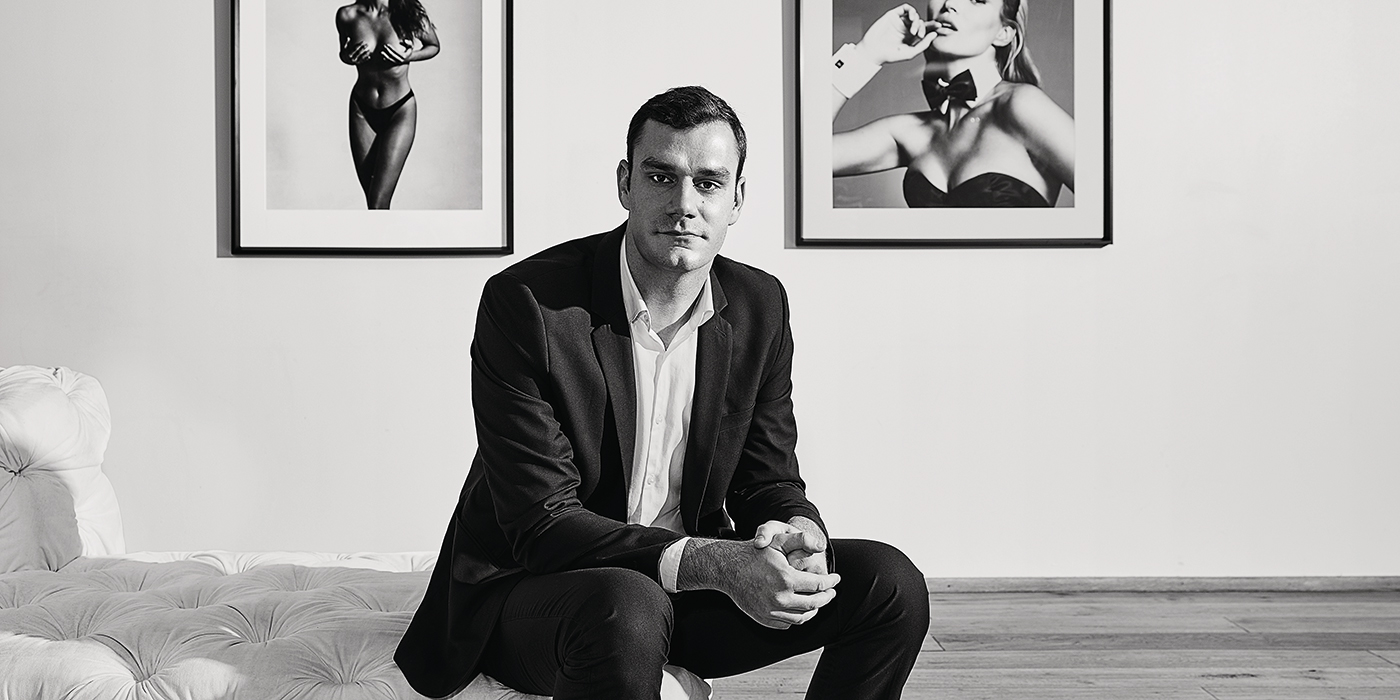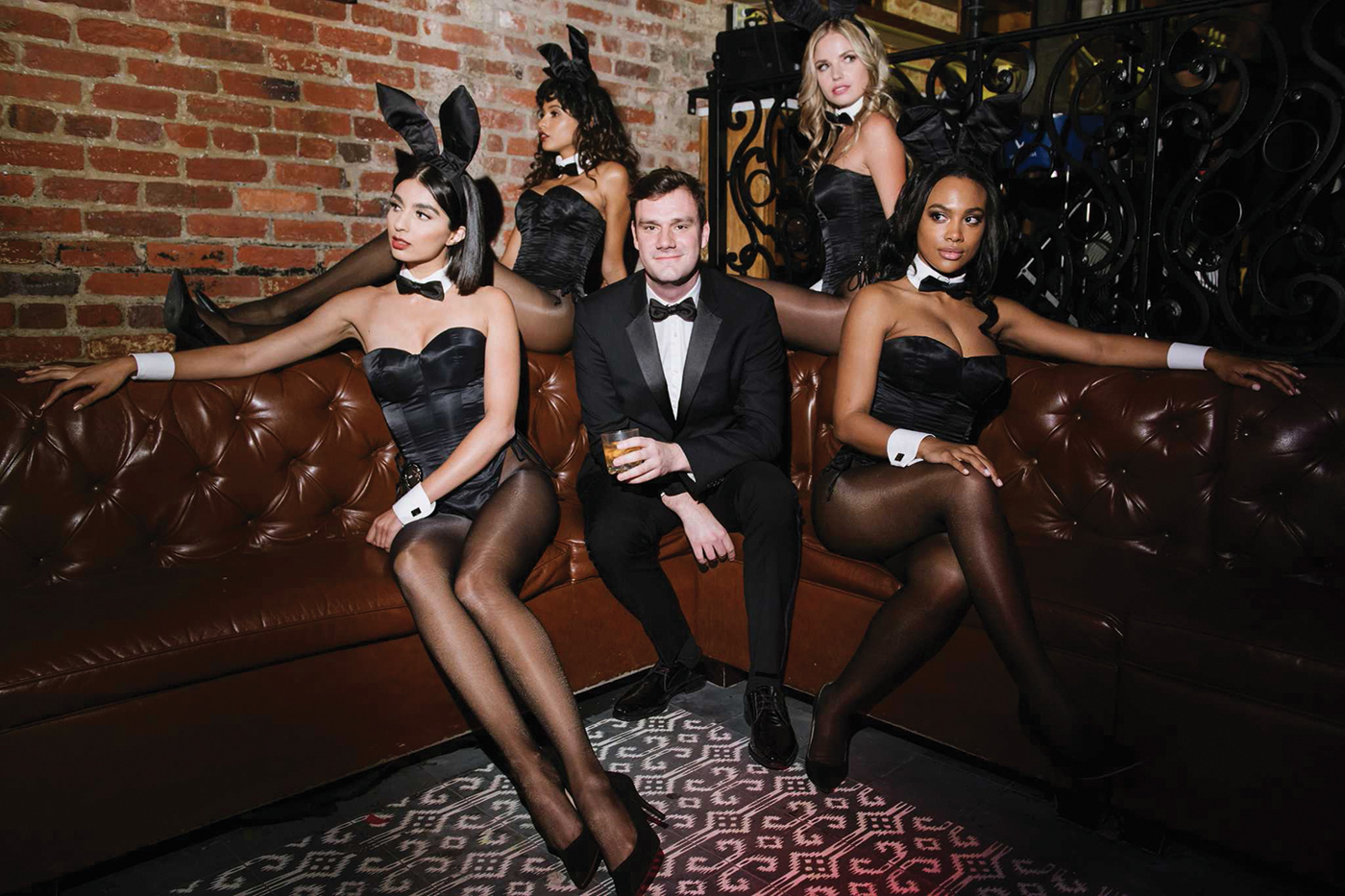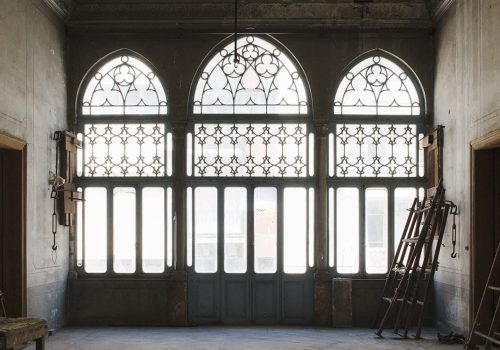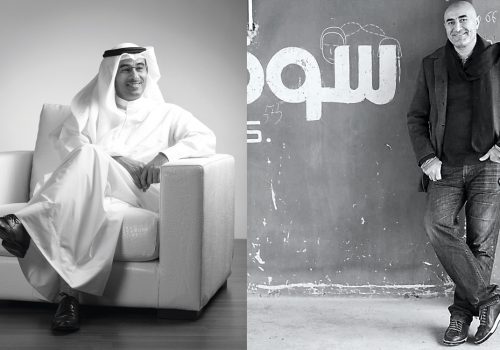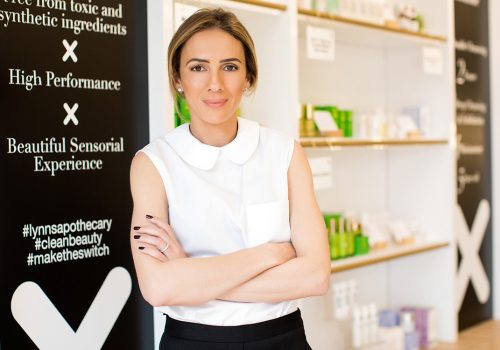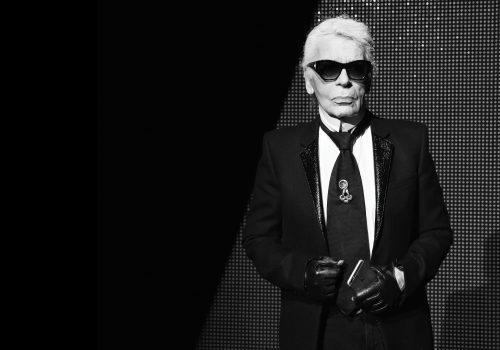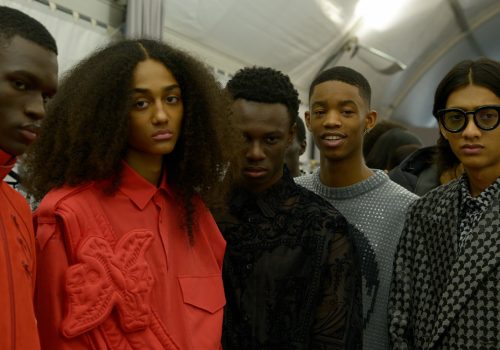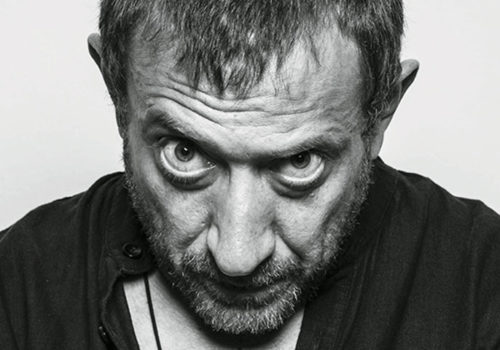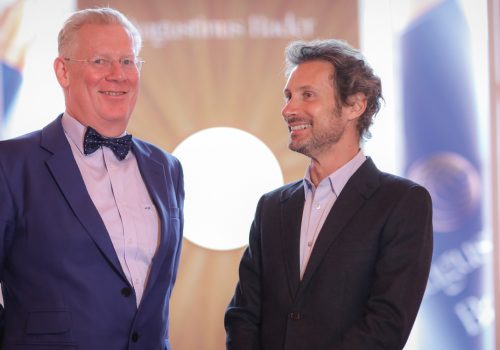Cooper Hefner has the kind of lineage that’d make some blush – with a mother who was a bunny girl and a father known for living a life even more daring than his infamous magazine.
“I thought everyone had pink flamingos and peacocks in their backyard. My classmates would come for field trips to look round the private zoo. But the real elephant in the room,” says Cooper Hefner, “was the full-size naked picture of my mum in the library.”
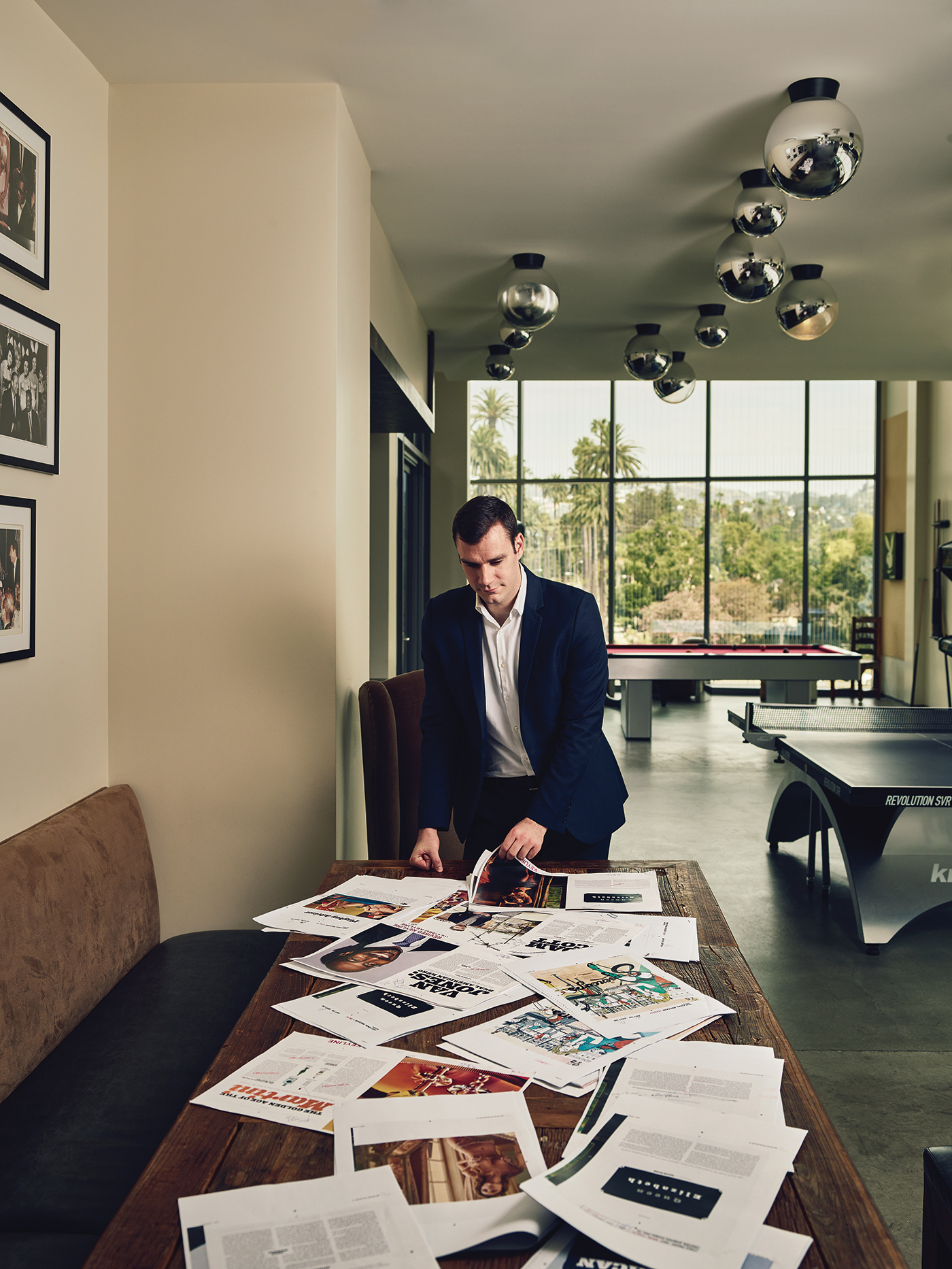
Photography: Spencer Lowell
The youngest of Hugh Hefner’s four children is reminiscing about growing up in the Playboy mansion. It is midnight at Playboy Club London in Mayfair and we are surrounded by beaming bunny girls in white fluffy tails with long floppy ears. Three striking transgender women in leopard-print swimsuits flit across the dancefloor. Hefner’s fiancée, the English actress Scarlett Byrne, is sitting in a demure white skirt and jacket discussing feminism with Ines Rau, the first transgender woman to appear in the magazine.
Hefner, who became the chief creative officer of Playboy Enterprises shortly before his father died at the age of 91 last year, is certainly more reserved and measured than Hefner senior. And, I would guess, monogamous. You couldn’t imagine him in the grotto or spread across the Jacuzzi surrounded by a tumble of Playmates. He admits he even finds the Playboy jet a bit of an effort. The Playmates, who used to babysit him in the vast Los Angeles garden, called him “nerdy” because he liked reading history books, while he is very respectful of them. “They were lovely and offered a unique insight into women,” he says diplomatically. “They had come from all over the place and added an element you couldn’t have found anywhere else.”
At only 26, Hefner is prepared to don purple silk pyjamas for the occasional party, but it is clear when I meet him at the club the next day in his black suit and buttoned-up shirt that he is determined to modernise Playboy. “My interests are very different from my dad’s. I have a wonderful fiancée and I am very lucky to have her,” he says. “Sitting around with six ladies has never been my thing. My dad loved that; it was a reflection of his life’s desires.”
But he’s a huge admirer of his father and refuses to be rude about the company he created 64 years ago. “I’ve thought a lot about what made the brand iconic and how we take that heritage and construct a narrative that makes sense for millennials,” Hefner says. “As gender norms change and the conversation about sexuality moves on, naming a transgender Playmate seemed the right thing to do. Ines Rau was perfect. It takes two minutes to realise that she is a pretty spectacular person and she is very beautiful.”
He would like Playboy to evolve while taking older readers with him, he explains. “The brand has predominantly focused on the heterosexual male, but it has always advocated for everyone to be able to celebrate sex and that should include all kinds of gender issues and both sexes. That’s why we have changed the slogan on the mag from ‘Entertainment for men’ to ‘Entertainment for all’. It was a reflection of the company being more than just a good old boys’ club of the past. My father was always an advocate of gay rights, and at its best Playboy has always been forward thinking and sophisticated as well as playful.”
Playboy now is as much about product as it is about sex. “It has 97 per cent global unaided brand awareness, but 50 per cent of our product is purchased by women. We are the most popular men’s clothing brand in China with suits, shirts, shoes,” Hefner explains. “The bunny logo is predominantly a sign of Americana in Asia, Africa and South America. It’s like the Nike swoosh.”
Shouldn’t they change the name ‘Playboy’ to something more inclusive? “I’m not sure we need to, and I don’t want to disown the past. Before Playboy existed, there was no one challenging the nuclear family of the 1950s. My dad believed that not everyone wanted to have just one mate for life; they wanted to experiment. That was how he lived his life aside from a few brief moments, one of which was when he married my mum [Kimberley Conrad], who had been a Playmate. Then for a few years he was committed to her.”
When they divorced, his father bought Kimberley a house next to his mock gothic-Tudor mansion. Hefner and his elder brother had the run of both properties. “I wouldn’t call my parents normal, but they tried very hard to provide us with as much of a normal life as possible,” he suggests. “I certainly didn’t walk around naked, but my parents didn’t wear much. The US was quite prudish and prurient in many areas of the country, and quite uncomfortable with nudity and sexuality. My parents disagreed and felt more like northern Europeans. There was a lot of nude art, too.”
He doesn’t think children should be shielded from sex. “It’s vital that the young talk about it. Many of the problems they are having now I think is because we don’t have conversations with them. They don’t know what is okay or not. They find sex frightening. Many aren’t having it until older as the expectations are so high and some of the porn they see online can be so weird. To stay quiet as parents and in society seems like a mistake.”
He wants to break down stereotypes but also call out what he thinks are examples of unacceptable behaviour. “I don’t like it when any people, religion or culture thinks that men and women have a particular role in society. Women should decide for themselves what they want, as should men. A woman should be able to be in charge of her own body. She should be able to choose whether to model for a magazine or work in an office, or have an abortion in certain instances.”
Hefner would like Playboy to be a feminist company. “My view of feminism is about allowing women the freedom to choose the life they want to live, whether that is to go down a road that is traditionally professional, to be a member of academia, to be a mother, an actress or a model.”
He doesn’t think the company is on the wrong side of the #MeToo debate either, despite the fact that the Playboy mansion was filled for years with older, successful, rich men partying with often impressionable younger women. “I view the #MeToo conversation as incredibly important, but it has a lot more to do with power than sex. We mustn’t make sex the enemy. There is nothing wrong with consensual sex; there is everything wrong with sex being used as a weapon,” he says, “or to humiliate women or as a bargaining tool.”
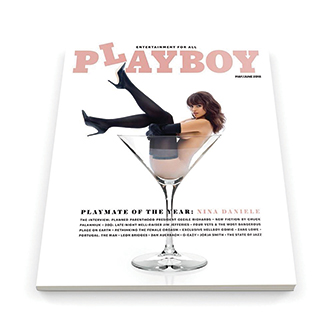
Playboy magazine changed its slogan from “Entertainment for Men” to “Entertainment for All” (printed above the Playboy logo) on the May/June 2018 issue cover.
He believes all children must be taught far more about sex and relationships. “It’s about respect and dialogue, making sure you know your partner, kindness and understanding. I was lucky that I grew up around adults who respected each other for who they were. Contrary to what some may say, my father was a romantic and a gentleman.”
His father, he says, spent a great deal of time with his children. “He was not the type of father who asked us if we had done our homework but, while some successful parents make their career their life, he was able to see a lot of me. He played dominoes, chess, cards and games with us. We would watch ‘The Simpsons’ with him, and he made it very clear that he thought it was great hanging out with us.”
Hefner’s older half-sister, Christie, now 65, was his role model, though. She was the Playboy Enterprises chairwoman for years and was his “inspiration” to join the family business. He left, briefly, when she was no longer at the company, in protest when they stopped having nude models. “I didn’t leave just because they stopped having nudes, but I spent a great deal of time at college learning about the history of Playboy. I thought, ‘How can we be a brand that is partially responsible for kick-starting the sexual revolution in the 20th century, and then remove a quality that makes Playboy unique?’ Asking people to cover up was almost acknowledging that we had lost the war.”
War is a surprising word to use, but the world, he believes, has become divided by sex. “In some regions women are being covered up and hidden away, and in others we have this extraordinary increase in extreme online porn. No one is being normal about sex any more. Mine was the first generation that was introduced to sex online. We didn’t have the experience of going into our parents’ bedroom and stealing our dad’s Playboys. It was all there on screen. The videos I saw at 14 were nasty and shocking. They set an incredibly unhealthy expectation of what we were supposed to be doing. It was terrifying.”
This made him want to keep publishing the magazine. “Playboy has just as important a role today in defining what a healthy attitude is to sex as it did in the 1960s and 70s. We would never try to debase or dehumanise women. Online there is a lot of violence against women and suggestions of rape. We need to talk to children about what normal is. A lot of people I know now have an unhealthy interpretation of relationships because they mistake the worst online porn for reality.”
He is particularly disturbed by the book and film ‘Fifty Shades of Grey’. “It has normalised some kinds of sex, but that doesn’t make it right. I find it fascinating that we have endorsed a film and book in society that advocates violence against women. That’s very strange.”
His father didn’t tell him how to have sex. “I had an awkward conversation with my mum when I was 14. She put a box of condoms in our bathrooms. I was mortified and asked why and she said, ‘I am not asking but just saying that when it happens, I want you to be safe.’”
Hefner of all people, living among film producers, can’t have been shocked by the Harvey Weinstein revelations about his behaviour with actresses. “Actually, it caught me off-guard. I suspect there are thousands more who have taken advantage of the position they are in, but I hadn’t seen it. Sex should not be the enemy. It should be fun, it should be a celebration of life. It is why we are all here – it should never be used in any way that is not enjoyable for the participants. The acts of individuals who use sex for their own advantage are horrifying.”
“We talk about feminism frequently, and why men can be topless on the cover of Men’s Health but a woman has to justify herself if she is in Playboy.”
His father must have used his position in this way occasionally. “My dad never did. My mum was Playmate of the Year [in 1989] who wound up in a relationship with him. This is one of the parts of the #MeToo movement that doesn’t make sense to me. There are women who like being Playmates. I am a liberal, but there are young people who call themselves progressives who seem to be very anti-sex full stop, and they seem to have a desire to remove sex entirely from the workplace. One of the few places you have the opportunity to meet the person you may spend the rest of your life with is at work. I’m not saying you should behave inappropriately at work, but to pretend that something fundamentally human like falling in love in an office can’t exist is absurd.” His father, he says, was always falling for his Playmates. “There were a number of people my dad worked with that he had a relationship with, but there certainly was not a policy of, ‘You have to sleep with this individual in order to move through this organisation.’ I know so many people who met the love of their life at work.”
Hefner, however, met his girlfriend online. “I saw her when she played Pansy Parkinson in the Harry Potter movies and sent her a message. A couple of years later we ended up getting coffee in Cologne, Germany, because we were both out there for our work. When she moved to LA, I couldn’t have been happier.”
He didn’t feel embarrassed about her posing in Playboy magazine. “She decided to do it. She likes the idea of owning her sexuality and wrote an essay to go with it, ‘The Feminist Mystique’. We talk about feminism frequently, and why men can be topless on the cover of Men’s Health but a woman has to justify herself if she is in Playboy.”
He says he expects to do at least half the housework and parenting when they marry and, he hopes, have children. “Women do seem to bear the brunt of things. Everything seems much worse for them: whether it’s a woman who wants to own her sexuality, has a desire to get to the top or wants to concentrate on her family, she is always being criticised. I grew up with a lot of women and I really enjoy their company. I’ve realised it’s exceptionally more difficult for them, juggling motherhood and work. I respect my grandmother, mother, sister and fiancée so much. They have to be far more resilient.”
His mother was a famous Playmate. “I reshot her cover for Mother’s Day. If you are a Playmate, you are never a former one. That was my point. I don’t want to be ageist; it seems very unfair that women are ignored as they get older. I wanted to show that and celebrate the older generation.”
Donald Trump was once on the cover of the magazine. “I met him as a kid and he used to bring Melania to the mansion. He shot an episode of ‘The Apprentice’ there. He is not nice about women. It is pretty clear he has a very unhealthy approach to how he interacts with the opposite sex.”
“Sitting around with six ladies has never been my thing. My dad loved that; it was a reflection of his life’s desires.”
If he wasn’t at Playboy, Hefner would think about going into politics. “I work with Children of the Night, which looks after trafficked children, and we raise awareness of issues such as breast cancer. I really want the organisation to play a role in the political place.”
The Brexit vote and Trump’s presidency, he suggests, are howls from the past. “Some people are afraid of the future. We need to embrace it. I didn’t want Playboy to be stuck in the last century. We all have to move on. We still have 500,000 copies sold in America, 26 foreign editions and it’s available in more than 100 countries, but the engagement is increasingly online. We stepped away from Facebook recently because of data concerns, but we do Instagram. We have casinos. I don’t feel bad about the gaming. I go to Las Vegas occasionally; I can’t gamble in my own clubs.”
The mansion, however, has been sold, and he doesn’t want to create another one. “I think I am a bit more boring than my dad.” It was a huge shock when the latter died. “It’s still hard. You have to be strong and stay focused. It didn’t bother me that everyone else felt they could discuss him. He would have loved that. I do the Military Reserve because my dad was a veteran and served during the Second World War. There were a great many sides to him.”
Neither of his elder brothers wanted to be involved with the company, but Hefner, an unlikely chief Playboy, does seem to love it. “It’s hard to find a better gig than this. I spend most of my time in Beverly Hills doing brand and creative, product and licensing. We have a lot of women applying. Kate Moss did our anniversary edition and she is a huge fan. There is a long tradition of great writers [from Jean-Paul Sartre to Ian Fleming] contributing to the magazine. I’m proud of Playboy.”
Would he let his grandmother read the magazine? “Sure. There are a lot of great articles. But my grandma is a Methodist Christian. She is very proud of me, but she is a little more traditional. She is the light of my life and I absolutely love her. I wouldn’t do anything that horrified her, but she is very pro-sex. Happiness makes you live longer and I think having regular sex can often make you happier. People should absolutely be having it often. Sex is relaxing, entertaining, not expensive. It’s normal, natural and healthy and we should be promoting it.”


